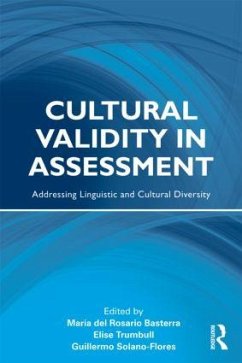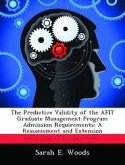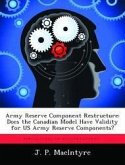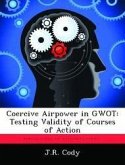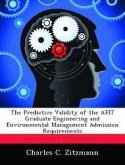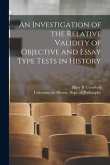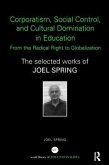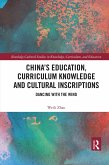Cultural Validity in Assessment
Addressing Linguistic and Cultural Diversity
Herausgeber: Basterra, María del Rosario; Solano-Flores, Guillermo; Trumbull, Elise
Cultural Validity in Assessment
Addressing Linguistic and Cultural Diversity
Herausgeber: Basterra, María del Rosario; Solano-Flores, Guillermo; Trumbull, Elise
- Broschiertes Buch
- Merkliste
- Auf die Merkliste
- Bewerten Bewerten
- Teilen
- Produkt teilen
- Produkterinnerung
- Produkterinnerung
This guide for educators looks at major issues in language testing and provides knowledge, techniques, and strategies to design and implement assessments for use in classrooms that maximize fairness and validity for all students.
Andere Kunden interessierten sich auch für
![The Predictive Validity of the Afit Graduate Management Program Admission Requirements: A Reassessment and Extension The Predictive Validity of the Afit Graduate Management Program Admission Requirements: A Reassessment and Extension]() Sarah E. WoodsThe Predictive Validity of the Afit Graduate Management Program Admission Requirements: A Reassessment and Extension62,99 €
Sarah E. WoodsThe Predictive Validity of the Afit Graduate Management Program Admission Requirements: A Reassessment and Extension62,99 €![Army Reserve Component Restructure: Does the Canadian Model Have Validity for US Army Reserve Components? Army Reserve Component Restructure: Does the Canadian Model Have Validity for US Army Reserve Components?]() J. P. MacintyreArmy Reserve Component Restructure: Does the Canadian Model Have Validity for US Army Reserve Components?62,99 €
J. P. MacintyreArmy Reserve Component Restructure: Does the Canadian Model Have Validity for US Army Reserve Components?62,99 €![Coercive Airpower in Gwot: Testing Validity of Courses of Action Coercive Airpower in Gwot: Testing Validity of Courses of Action]() J. R. CodyCoercive Airpower in Gwot: Testing Validity of Courses of Action62,99 €
J. R. CodyCoercive Airpower in Gwot: Testing Validity of Courses of Action62,99 €![The Predictive Validity of the AFIT Graduate Engineering and Environmental Management Admission Requirements The Predictive Validity of the AFIT Graduate Engineering and Environmental Management Admission Requirements]() Charles C. ZitzmannThe Predictive Validity of the AFIT Graduate Engineering and Environmental Management Admission Requirements61,99 €
Charles C. ZitzmannThe Predictive Validity of the AFIT Graduate Engineering and Environmental Management Admission Requirements61,99 €![An Investigation of the Relative Validity of Objective and Essay Type Tests in History An Investigation of the Relative Validity of Objective and Essay Type Tests in History]() Mary R CrawfordAn Investigation of the Relative Validity of Objective and Essay Type Tests in History25,99 €
Mary R CrawfordAn Investigation of the Relative Validity of Objective and Essay Type Tests in History25,99 €![Corporatism, Social Control, and Cultural Domination in Education Corporatism, Social Control, and Cultural Domination in Education]() Joel SpringCorporatism, Social Control, and Cultural Domination in Education66,99 €
Joel SpringCorporatism, Social Control, and Cultural Domination in Education66,99 €![China's Education, Curriculum Knowledge and Cultural Inscriptions China's Education, Curriculum Knowledge and Cultural Inscriptions]() Weili ZhaoChina's Education, Curriculum Knowledge and Cultural Inscriptions62,99 €
Weili ZhaoChina's Education, Curriculum Knowledge and Cultural Inscriptions62,99 €-
-
-
This guide for educators looks at major issues in language testing and provides knowledge, techniques, and strategies to design and implement assessments for use in classrooms that maximize fairness and validity for all students.
Hinweis: Dieser Artikel kann nur an eine deutsche Lieferadresse ausgeliefert werden.
Hinweis: Dieser Artikel kann nur an eine deutsche Lieferadresse ausgeliefert werden.
Produktdetails
- Produktdetails
- Verlag: Routledge
- Seitenzahl: 320
- Erscheinungstermin: 20. Dezember 2010
- Englisch
- Abmessung: 229mm x 152mm x 17mm
- Gewicht: 466g
- ISBN-13: 9780415999809
- ISBN-10: 0415999804
- Artikelnr.: 29931393
- Herstellerkennzeichnung
- Libri GmbH
- Europaallee 1
- 36244 Bad Hersfeld
- gpsr@libri.de
- Verlag: Routledge
- Seitenzahl: 320
- Erscheinungstermin: 20. Dezember 2010
- Englisch
- Abmessung: 229mm x 152mm x 17mm
- Gewicht: 466g
- ISBN-13: 9780415999809
- ISBN-10: 0415999804
- Artikelnr.: 29931393
- Herstellerkennzeichnung
- Libri GmbH
- Europaallee 1
- 36244 Bad Hersfeld
- gpsr@libri.de
María del Rosario Basterra is Independent Educational Consultant, Washington, DC, specializing in issues related to English language learners, language minority students, multicultural education, and preschool education. Elise Trumbull is Independent Educational Consultant, Oakland, CA, specializing in issues related to language and culture in schooling, and Lecturer, California State University, Northridge, Department of Educational Psychology and Counseling. Guillermo Solano-Flores is Associate Professor, Bilingual Education and English as a Second Language, University of Colorado at Boulder.
Foreword
Eugene García
Preface
Acknowledgments
PART I
Cultural Validity in Assessment-Basic Concepts
1. Assessing the Cultural Validity of Assessment Practices: An
Introduction-Guillermo Solano-Flores
2. The Role of Language in Assessment- Elise Trumbull and Guillermo
Solano-Flores
PART II
Assessing Students of Linguistically and Culturally Diverse Backgrounds
3. Assessing English Language Learners: Critical Issues- Jamal Abedi
4. Cognition, Culture, Language, and Assessment: How to Select Culturally
Valid Assessments in the Classroom- María del Rosario Basterra
5. Using Appropriate Assessment Processes: How to Get Accurate Information
about the Academic Knowledge and Skills of English Language Learners -
Rebecca Kopriva and Ursula Sexton
6. Ensuring Valid Educational Assessments for ELL Students: Scores, Score
Interpretation, and Assessment Uses- Richard P. Durán
7. Promoting Cultural Validity in the Assessment of Bilingual Special
Education Students- John J. Hoover and Janette Klingner
8. Overview of Current Federal Policies in Assessment and Accountability
and Their Impact on ELL Students- Julia Lara and Magda Chia
PART III
Field Efforts to Increase Cultural Validity in Assessment
9. Language Arts: Designing and Using a Reading Assessment for Learners
Transitioning to English-Only Instruction- Elise Trumbull and Nanette
Koelsch
10. Addressing the Language Demands of Mathematics Assessment: Using a
Language Framework and Field Research Findings- Elise Trumbull and
Guillermo Solano-Flores
11. Science and Literacy Assessments with English Language Learners- Okhee
Lee, Alexandra Santau, and Jaime Maerten-Rivera
PART IV
Conclusion
12. Reflections on the Promise of Cultural Validity in Assessment- Elise
Trumbull, María del Rosario Basterra, and Guillermo Solano-Flores
Eugene García
Preface
Acknowledgments
PART I
Cultural Validity in Assessment-Basic Concepts
1. Assessing the Cultural Validity of Assessment Practices: An
Introduction-Guillermo Solano-Flores
2. The Role of Language in Assessment- Elise Trumbull and Guillermo
Solano-Flores
PART II
Assessing Students of Linguistically and Culturally Diverse Backgrounds
3. Assessing English Language Learners: Critical Issues- Jamal Abedi
4. Cognition, Culture, Language, and Assessment: How to Select Culturally
Valid Assessments in the Classroom- María del Rosario Basterra
5. Using Appropriate Assessment Processes: How to Get Accurate Information
about the Academic Knowledge and Skills of English Language Learners -
Rebecca Kopriva and Ursula Sexton
6. Ensuring Valid Educational Assessments for ELL Students: Scores, Score
Interpretation, and Assessment Uses- Richard P. Durán
7. Promoting Cultural Validity in the Assessment of Bilingual Special
Education Students- John J. Hoover and Janette Klingner
8. Overview of Current Federal Policies in Assessment and Accountability
and Their Impact on ELL Students- Julia Lara and Magda Chia
PART III
Field Efforts to Increase Cultural Validity in Assessment
9. Language Arts: Designing and Using a Reading Assessment for Learners
Transitioning to English-Only Instruction- Elise Trumbull and Nanette
Koelsch
10. Addressing the Language Demands of Mathematics Assessment: Using a
Language Framework and Field Research Findings- Elise Trumbull and
Guillermo Solano-Flores
11. Science and Literacy Assessments with English Language Learners- Okhee
Lee, Alexandra Santau, and Jaime Maerten-Rivera
PART IV
Conclusion
12. Reflections on the Promise of Cultural Validity in Assessment- Elise
Trumbull, María del Rosario Basterra, and Guillermo Solano-Flores
Foreword
Eugene García
Preface
Acknowledgments
PART I
Cultural Validity in Assessment-Basic Concepts
1. Assessing the Cultural Validity of Assessment Practices: An
Introduction-Guillermo Solano-Flores
2. The Role of Language in Assessment- Elise Trumbull and Guillermo
Solano-Flores
PART II
Assessing Students of Linguistically and Culturally Diverse Backgrounds
3. Assessing English Language Learners: Critical Issues- Jamal Abedi
4. Cognition, Culture, Language, and Assessment: How to Select Culturally
Valid Assessments in the Classroom- María del Rosario Basterra
5. Using Appropriate Assessment Processes: How to Get Accurate Information
about the Academic Knowledge and Skills of English Language Learners -
Rebecca Kopriva and Ursula Sexton
6. Ensuring Valid Educational Assessments for ELL Students: Scores, Score
Interpretation, and Assessment Uses- Richard P. Durán
7. Promoting Cultural Validity in the Assessment of Bilingual Special
Education Students- John J. Hoover and Janette Klingner
8. Overview of Current Federal Policies in Assessment and Accountability
and Their Impact on ELL Students- Julia Lara and Magda Chia
PART III
Field Efforts to Increase Cultural Validity in Assessment
9. Language Arts: Designing and Using a Reading Assessment for Learners
Transitioning to English-Only Instruction- Elise Trumbull and Nanette
Koelsch
10. Addressing the Language Demands of Mathematics Assessment: Using a
Language Framework and Field Research Findings- Elise Trumbull and
Guillermo Solano-Flores
11. Science and Literacy Assessments with English Language Learners- Okhee
Lee, Alexandra Santau, and Jaime Maerten-Rivera
PART IV
Conclusion
12. Reflections on the Promise of Cultural Validity in Assessment- Elise
Trumbull, María del Rosario Basterra, and Guillermo Solano-Flores
Eugene García
Preface
Acknowledgments
PART I
Cultural Validity in Assessment-Basic Concepts
1. Assessing the Cultural Validity of Assessment Practices: An
Introduction-Guillermo Solano-Flores
2. The Role of Language in Assessment- Elise Trumbull and Guillermo
Solano-Flores
PART II
Assessing Students of Linguistically and Culturally Diverse Backgrounds
3. Assessing English Language Learners: Critical Issues- Jamal Abedi
4. Cognition, Culture, Language, and Assessment: How to Select Culturally
Valid Assessments in the Classroom- María del Rosario Basterra
5. Using Appropriate Assessment Processes: How to Get Accurate Information
about the Academic Knowledge and Skills of English Language Learners -
Rebecca Kopriva and Ursula Sexton
6. Ensuring Valid Educational Assessments for ELL Students: Scores, Score
Interpretation, and Assessment Uses- Richard P. Durán
7. Promoting Cultural Validity in the Assessment of Bilingual Special
Education Students- John J. Hoover and Janette Klingner
8. Overview of Current Federal Policies in Assessment and Accountability
and Their Impact on ELL Students- Julia Lara and Magda Chia
PART III
Field Efforts to Increase Cultural Validity in Assessment
9. Language Arts: Designing and Using a Reading Assessment for Learners
Transitioning to English-Only Instruction- Elise Trumbull and Nanette
Koelsch
10. Addressing the Language Demands of Mathematics Assessment: Using a
Language Framework and Field Research Findings- Elise Trumbull and
Guillermo Solano-Flores
11. Science and Literacy Assessments with English Language Learners- Okhee
Lee, Alexandra Santau, and Jaime Maerten-Rivera
PART IV
Conclusion
12. Reflections on the Promise of Cultural Validity in Assessment- Elise
Trumbull, María del Rosario Basterra, and Guillermo Solano-Flores

